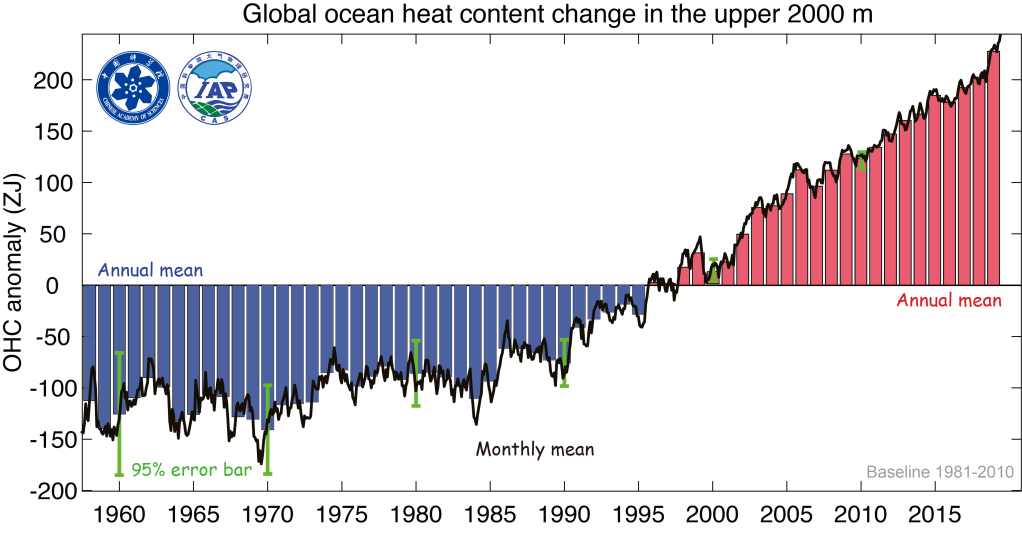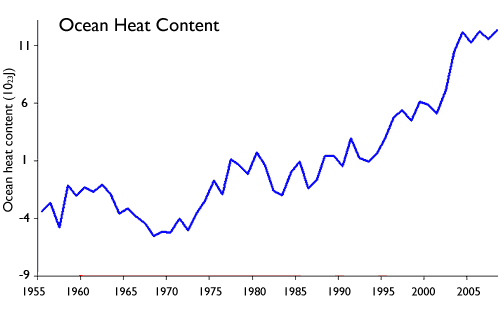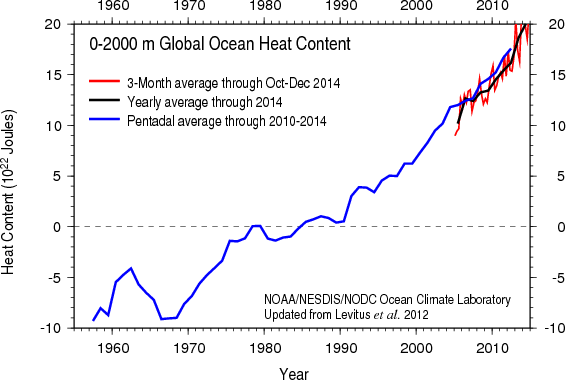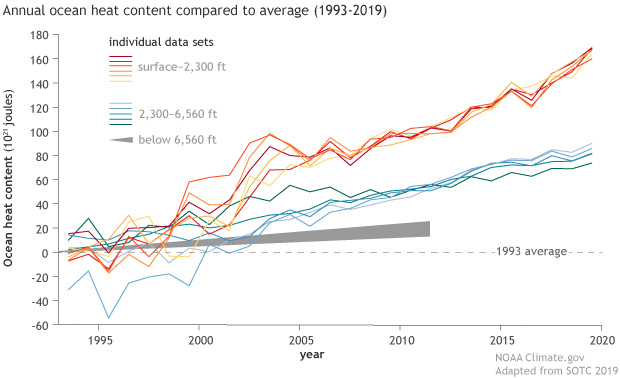Ocean Temperature Rise
About two-thirds of global sea level rise is due to meltwater from glaciers and ice sheets the vast expanses of ice that cover Antarctica and Greenland. Sea surface temperature increased during the 20 th century and continues to rise.
 Climate Change Indicators Sea Surface Temperature Climate Change Indicators In The United States Us Epa
Climate Change Indicators Sea Surface Temperature Climate Change Indicators In The United States Us Epa
In Greenland most of the ice loss stems from warming air temperatures that melt the surface of the ice sheet as well as calving from the glaciers that empty into the sea.

Ocean temperature rise. Every 10 days or so according to their programmed instructions they rise through the water recording temperature and salinity as they ascend. Sea Temperature Rise. Because the oceans are enormous and because water takes much more energy to heat up than air that translates to a temperature increase of a little more than one degree Fahrenheit.
Known as Argo floats the sensors drift through the ocean at different depths. The comparison showed a 11-degree Fahrenheit 059-degree Celsius temperature increase at the oceans surface over the last 135 years a result corroborated by a large body of sea-surface. While 2004 to 2010 saw oceans rise by about 15 millimeters in total this value doubled for 2010 to 2016.
Increasing ocean temperatures affect marine species and ecosystems. Hotter oceans lead to more severe storms and disrupt the water cycle meaning more floods droughts and wildfires as well as an inexorable rise in sea level. As more carbon dioxide is released enhancing the greenhouse effect much of the heat is absorbed by the oceans.
Rising temperatures cause coral bleaching and the loss of breeding grounds for marine fishes and mammals. Higher ocean temperatures around Antarctica increase the melting of these ice shelves resulting in an acceleration of land ice into the ocean and consequently leading to more sea-level rise. As global warming speeds up so does the rise in sea levels.
One of the most significant impacts of climate change is the warming not only of our atmosphere but also of our lands and waters. The ocean absorbs most of the excess heat from greenhouse gas emissions leading to rising ocean temperatures. Rising sea temperatures can threaten marine plants and animals by impeding migrations reproduction and other critical life.
Sea surface temperature has been consistently higher during the past three decades than at any other time since reliable observations began in 1880 see Figure 1. The most recent special report from the Intergovernmental Panel on Climate Change says we can expect the oceans to rise between 10 and 30 inches 26 to 77 centimeters by. The Ocean State Report reveals an overall trend globally of surface warming based on evidence from 1993 to 2018 with the largest rise in the Arctic.
In turn this warmer water can hold. Carbonate gets used up and has to be re-stocked by upwelling of deeper waters which are rich in carbonate dissolved from limestone and other rocks. Among these are a fleet of more than 3000 robotic floats that measure ocean temperature around the world.
Sea surface temperature ocean heat content sea level rise melting of glaciers and ice sheets CO2 emissions and atmospheric concentrations are increasing at an accelerating rate according to. SST changes diurnally like the air above it but to a lesser degree. Eyes on the Earth Track Earths vital signs from space and fly along with NASAs Earth-observing satellites in an interactive 3D visualization.
Travel through Earths recent climate history and see how increasing carbon dioxide global temperature and sea ice have changed over time. Rising ocean temperatures also affect the benefits. During the past hundred years the average surface temperature of the seas has risen by about 09C 16F according to Americas National Oceanic and Atmospheric Administration.
Warm sea surface temperatures are known to be a cause of tropical cyclogenesis over the Earth s oceans. Tropical cyclones can also cause a cool wake due to turbulent mixing of the upper 30 metres 100 ft of the ocean. From 1901 through 2015 temperature rose at an average rate of 013F per decade see Figure 1.
As temperatures rise carbon dioxide leaks out of the ocean like a glass of root beer going flat on a warm day.
The Ocean Cannot Absorb Much More Co2 Insead Knowledge
 Usgcrp Indicator Details Globalchange Gov
Usgcrp Indicator Details Globalchange Gov
 Does Ocean Cooling Prove Global Warming Has Ended
Does Ocean Cooling Prove Global Warming Has Ended
 Sea Surface Temperature Wikipedia
Sea Surface Temperature Wikipedia
Sea Temperature Global Greenhouse Warming
2012 State Of The Climate Sea Surface Temperature Noaa Climate Gov
 Ocean Heat Content Rises News National Centers For Environmental Information Ncei
Ocean Heat Content Rises News National Centers For Environmental Information Ncei
 This Chart Of Rising Ocean Temperatures Is Terrifying Grist
This Chart Of Rising Ocean Temperatures Is Terrifying Grist
 The Temperature Of The Ocean Is Rising The Economist
The Temperature Of The Ocean Is Rising The Economist
 Climate Change Ocean Heat Content Noaa Climate Gov
Climate Change Ocean Heat Content Noaa Climate Gov
 Climate Change Indicators Sea Surface Temperature Climate Change Indicators In The United States Us Epa
Climate Change Indicators Sea Surface Temperature Climate Change Indicators In The United States Us Epa
 Effects Of Climate Change On Oceans Wikipedia
Effects Of Climate Change On Oceans Wikipedia


Comments
Post a Comment